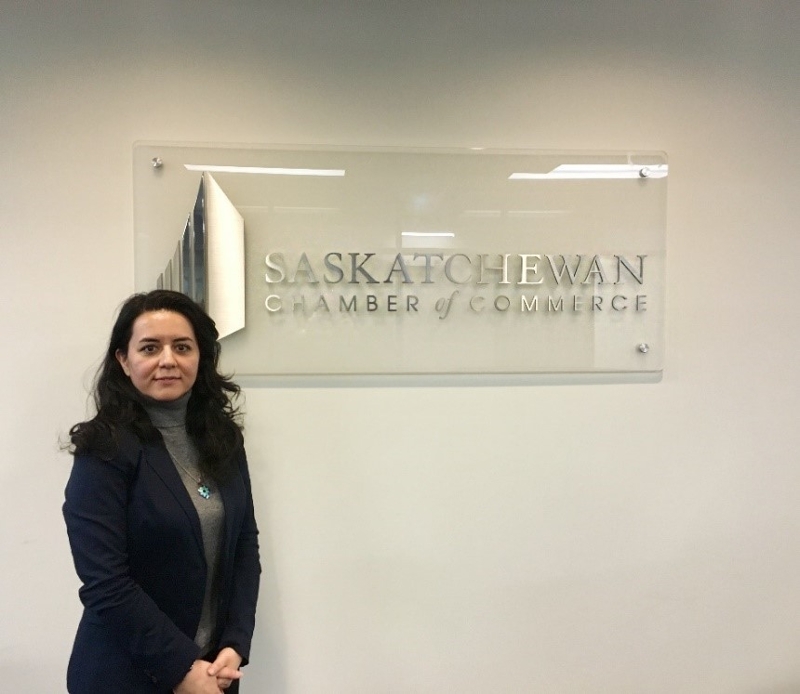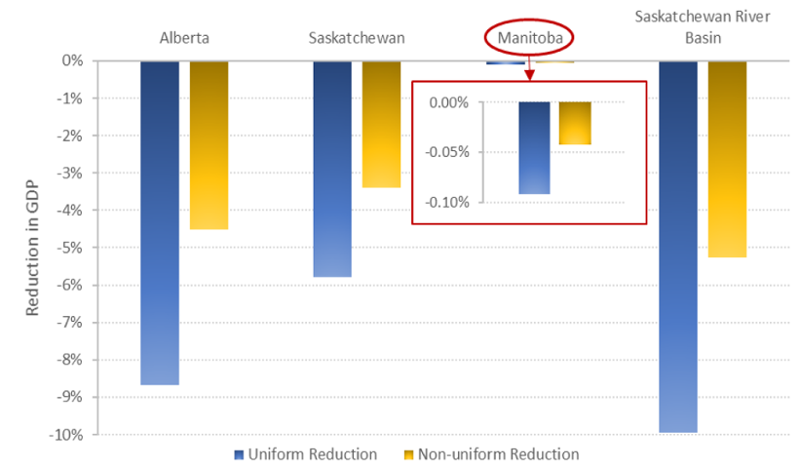
User engagement strategies for data challenges in the Integrated Modelling Program for Canada (IMPC)
Modelers are no strangers to data challenges. While reliable data is important for prediction and modelling work, researchers often cannot acquire information inputs that are quality controlled or at the ideal time or spatial scale. Sometimes the right data do not exist. Data, and data compatibility, become even more important when linking information from diverse disciplines such as economics and water resources modelling.
By Hayley Carlson and Leila Eamen
At the same time, research relationships are important to ensure that decision-makers, organizations and communities will adopt new research knowledge. Knowledge uptake is a specific objective of the Integrated Modelling Program for Canada (IMPC), a User Question-led (Pillar 3) project of Global Water Futures (GWF). The project aims to inform management and policy decisions to predict and manage risks to water resources across Canada.
These two different objectives recently came to a head for Leila Eamen, a PhD student with GWF’s IMPC project under the supervision of Dr. Saman Razavi and Dr. Roy Brouwer. Her research develops a hydro-economic model to capture the interrelationships between water and the economy, and assess the economic impacts of climate change and different policy decisions in the Saskatchewan River Basin. “I spent several months talking to people from provincial agencies responsible for water management, like the Water Security Agency and Alberta Environment and Parks,” Leila says. “My conversations with them, and with others from Agriculture and Agri-Food Canada, the Saskatchewan Ministry of Agriculture and Alberta Agriculture and Forestry, helped our research team gather the right data and understand more about what was present and what might be missing.”
The IMPC research team uses monthly meetings to share information and discuss data opportunities and challenges in the water resources modelling sub-projects of IMPC, led by Dr. Saman Razavi. The interdisciplinary nature of the modelling work sometimes makes linking data difficult – for example, economic data and water use data often come in different spatial and temporal resolutions (e.g., Brouwer and Hofkes, 2008; Cai, 2008).
“We definitely came to a point in the research where we were facing some data-related challenges,” Leila says. “In addition to the resolution issues, there are multiple sources of data, and data are not necessarily compatible across jurisdictions.”
To resolve these issues, Hayley Carlson, User Engagement Specialist with IMPC, suggested Leila approach the Saskatchewan Chamber of Commerce, an organization representing the Saskatchewan business community and headquartered in Regina. Hayley used her existing network of contacts - including Bob Halliday, a member of IMPC’s Knowledge Mobilization Oversight Committee - to gauge whether the Chamber may be interested in a conversation. Hayley and Leila learned that the Chamber recently established a Water Council to discuss and collaborate on water issues that matter to industries in Saskatchewan. The Council acts as a type of boundary organization between science and policy (Cash et al. 2003), compiling research and scientific information to disseminate to members and improve the long-term governance of Saskatchewan water systems.
“I wanted to reach out to the Saskatchewan Chamber to find out more about what they know about the data and the challenges in linking them, and to determine whether they had access to additional data that would improve the model,” Leila explains. In the absence of perfect data, modelers often have to make a number of assumptions. One additional objective of meeting with the Water Council was to ascertain what kind of assumptions seem reasonable from the perspective of industry participants.
Representatives of the Council were eager to connect on the research and invited Leila and Hayley to speak about progress and challenges. Leila shared preliminary results for two different water supply scenarios under climate change. The discussion was productive, and pointed to mutually beneficial information sharing opportunities between the Water Council and the IMPC research team moving forward. The Council also had the opportunity to discuss projects that might be of interest to IMPC and other water researchers in the future, such as the establishment of a water data hub for researchers.
“The Council had a lot of important insights to offer,” Leila adds. “Some of our discussion focused on how water reuse and recycling opportunities are important in Saskatchewan because they reduce input costs and costs associated with water treatment. The Council pointed out that many industries in Saskatchewan are trade-exposed, so this could be a competitive advantage.” The Council was also interested in multi-year drought scenarios and climate change impacts.
Social science literature emphasizes that the process of producing new knowledge is important to its uptake in the long run – it doesn’t always work well to engage with communities after the research is already completed! Best practices such as including stakeholder communities in relevant dialogue about the research (Cash et al. 2003), negotiating research goals and mutual benefits (Clarke & Clarke, 2011), and two-way, iterative engagement throughout the research process (Dilling & Lemos, 2011) are important for successful research uptake. Leila plans to continue to engage with the Saskatchewan Chamber as she moves forward in her modeling work.
“Ultimately I think this process will improve the research as I benefit from continued conversations with individuals who have significant industry expertise in the prairie provinces,” Leila notes. “It was positive to learn the Chamber saw multiple mutually beneficial opportunities and are willing to participate in the research process in the future.”
The IMPC team is gearing up to publish their first article on the hydro-economic model for the Saskatchewan River Basin. This will be available in 2019.
References
Brouwer, R., & Hofkes, M. 2008. “Integrated hydro-economic modelling: Approaches, key issues and future research directions.” Ecological Economics, 66(1), 16-22
Cai, X. 2008. “Implementation of holistic water resources-economic optimization models for river basin management–reflective experiences.” Environmental Modelling & Software, 23(1), 2-18
Cash D., Clark W., Alcock F., Dickson N., Eckley N. and J. Jager. 2002. “Salience, Credibility, Legitimacy and Boundaries: Linking Research, Assessment and Decision Making.” John F. Kennedy School of Government, Harvard University. Faculty Research Working Papers Series RWP02-046.
Cash D.W. et al. 2003. “Knowledge systems for sustainable development.” Special Feature. PNAS 100(14): 8086-8091.
Clark, J. R. A. & R. Clarke, 2011. “Local sustainability initiatives in English national parks: what role for adaptive governance?” Land Use Policy, 28, 314–324.
Dilling, L., & M.C. Lemos, 2011. “Creating usable science: opportunities and constraints for climate knowledge use and their implications for science policy.” Global Environmental Change, 21(2): 680- 689.
